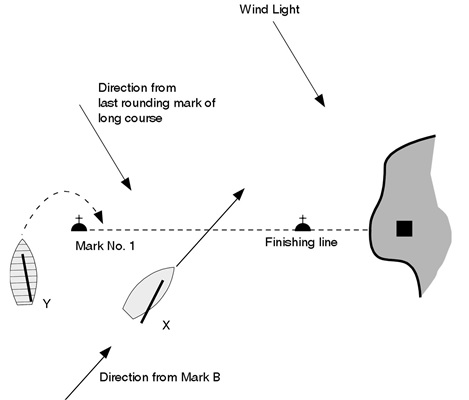



CASE 45
Definitions, Finish
Rule 62.1(a) Redress
Rule 64.2, Decisions: Decisions on Redress
When a boat fails to finish correctly because of a race
committee error, but none of the boats racing gains or loses
as a result, an appropriate and fair form of redress is to
score all the boats in the order they crossed the finishing
line.
Facts
During the day, the class sailed two races. After the first race, which the
boats finished leaving Mark 1 to starboard, the wind became light.
Accordingly, the race officer set a shorter second course and issued a change
to the sailing instructions stating that, although Mark B was the last
rounding mark, Mark 1 was to be left to starboard. The same finishing line
mark was being used for another race still using the longer course with a
downwind last leg, and the race officer had been advised not to set courses
that might lead to different boats passing a finishing mark or crossing the
finishing line in opposite directions.
X and two other boats finished leaving Mark 1 to port and were scored DNF.
Y, followed by the rest of the fleet, sailed the course prescribed by the
change to the sailing instructions, leaving Mark 1 to starboard. They thus
sailed a ‘hook round’ finish as shown in the diagram.
 X requested redress on the grounds that the race committee had not applied
the definition Finish correctly when it awarded first place to Y, whereas X
had been the first boat to finish as required by the definition. The protest
committee gave redress, agreeing that X and the other two boats had
finished correctly, and reinstated them in the race. For boats not so finishing,
the committee exercised its discretion under rule 64.3 to ‘make as fair an
arrangement as possible for all boats affected.’ It adjusted the race scores
according to the order in which all the boats crossed the finishing line,
without regard to the direction in which they crossed it.
X appealed against the new finishing order, claiming that the wording of the
definition Finish was unequivocal and stating that such an arrangement
would negate the definition and defeat its purpose, which, she believed, was
to prevent ‘hook round’ finishes.
X requested redress on the grounds that the race committee had not applied
the definition Finish correctly when it awarded first place to Y, whereas X
had been the first boat to finish as required by the definition. The protest
committee gave redress, agreeing that X and the other two boats had
finished correctly, and reinstated them in the race. For boats not so finishing,
the committee exercised its discretion under rule 64.3 to ‘make as fair an
arrangement as possible for all boats affected.’ It adjusted the race scores
according to the order in which all the boats crossed the finishing line,
without regard to the direction in which they crossed it.
X appealed against the new finishing order, claiming that the wording of the
definition Finish was unequivocal and stating that such an arrangement
would negate the definition and defeat its purpose, which, she believed, was
to prevent ‘hook round’ finishes.
Decision
X’s appeal is dismissed. Because the sailing instruction that conflicted with
the definition Finish was invalid, issuing it was an improper action of the
race committee that qualified the three boats for consideration for redress
under rule 62.1(a). None of the boats gained or lost as a result of the race
committee error, so the redress awarded was appropriate. It was also as fair
an arrangement as possible for all boats affected, as required by rule 64.3.
GBR 1979/1






